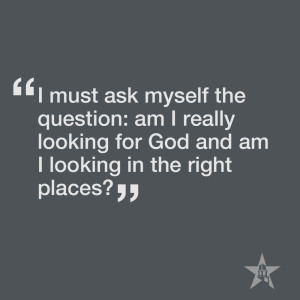I often feel like I am stumbling through my faith. I’m a pilgrim who doesn’t know her path, a disciple without a prophet. This feeling comes to every person of faith at some point if we are willing to grapple with our questions. Some call it “the dark night of the soul” or “our desert time.” But these characterizations seem, to me, incomplete. They suggest that wandering is a bad thing, something to get through as quickly as possible. However, it is in these times of ambiguity that the veil seems at its thinnest. I stop blindly going through the motions of my faith, and I take time to re-examine the foundation. Christ is lifted from stained-glass panes, and comes to me asking, “Who do you say I am?”

Right now, I don’t know the answer to that. I flounder, asking how I can profess a God of love if He seems to hide himself and then punishes those who don’t believe in Him. The problem with the way I see God right now is that He is ambiguous. He has the power to make himself known to an individual in an unquestionable way, yet He seldom does so. St. Anselm, an eleventh century monk and theologian, wrote, “It is thou that hast made me, and hast made me anew, and hast bestowed upon me all the blessings I enjoy; and not yet do I know thee. Finally, I was created to see thee and not yet have I done that for which I was made.” If a person of great faith like St. Anselm remained uncertain about the nature of God, how can a wandering pilgrim such as myself ever hope to understand Him?
This is the reason so many people of faith try to rush through their seasons of disbelief. They are uncomfortable with the questions. But if we leave our search at this seemingly hopeless point, it is so easy to make the inference that because God cannot be seen and understood, He does not exist. This is not an irrational reaction, but it can be driven by frustration. Emotionalism is just as unacceptable a reason to leave a faith as it is to stay in one.
So what are we left with, in searching for a God who seems so untouchable? Some would say that asking why we cannot completely understand Him is like asking why we can’t drink the ocean. Seventeenth century philosopher Blaize Pascal commented on God’s ambiguity, saying, “If there were no obscurity man would not feel his corruption: if there were no light man could not hope for a cure. Thus it is not only right but useful for us that God should be partly concealed and partly revealed, since it is equally dangerous for man to know God without knowing his own wretchedness as to know his own wretchedness without knowing God.” That, to me, is one of the most irritating and unsatisfying answers in the history of theology. Because at the root of my question, one more has always remained hidden.
I realize I can’t understand all there is to know about God, but couldn’t He, at the very least, let me see Him? If I could even catch a glimpse, it would be enough to sustain me for the rest of my life. I would, like Peter, step out of the boat and begin my first timid steps toward my Father. So why doesn’t He just show up?
For me, it all boils down to this. I must ask myself the question: am I really looking for God and am I looking in the right places? Through all my wandering in the desert, crying out for the answers to why I can’t see Him, have I even had my eyes open? Am I like the Jews in the wilderness, so blind to their own issues that they place the blame on God? I believe I’ve been searching because I feel angst about God, but having angst and actively searching are not the same thing.
Perhaps, as a professor of mine once said, God is like a fox that lives in the woods behind our house. We know people who have seen it, they assure us it’s there. But we have never caught sight of it ourselves, and so we disgruntledly begin to question its existence. But seeing the fox is a two sided thing; it’s not all about the seeker. The fox has a say in whether or not it will be seen, and where it will show up. What we really have to question is whether we know enough about the fox’s character to guess where it might come next.
God walks silently. We must listen for His footfall. In my wandering, I will be still and wait quietly. Maybe then I will be aware enough to see Him when He steps wordlessly from the underbrush.
Rachel is a senior writing major.

One reply on “The Importance of the Desert”
And, when you see and know her/him, how will it change your life? Or, is it the searching and not knowing that makes life worthy?
Beautifully written, Rachel.